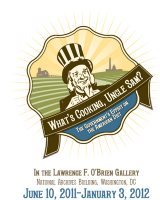- See what WWF thinks will make agriculture sustainable.
- Americans are dying younger. Obesity partly to blame.
- Study shows how scientists can get farmers to innovate. And vice versa?
- Iron-age beer in France. “Beer … might have resembled modern home brews.” Which might have created a nation of wine-drinkers.
- Voice of America ♥ Nourishing the Planet. (African farmers also important.)
- Bacteria in mosses on tree branches fertilize forest soils. How long before the whole thing is available in a packet?
- Bioengineering the prairie. Together with, presumably, its crop wild relatives.
Nibbles: Bramleys, FAO vs Big AG, Biofuels, Honduras, Indigenous food
- Awesome apple tree awes impressionable TV reporter shock.
- Food fight!
- Food fight referee?
- Recent developments in the world of biofuels; CABI sorts the good, the bad and the indifferent.
- A blogger asks: “What is the appropriate mix of policies regarding agriculture in Honduras?“
- Watch a video on an indigenous food festival in Thailand by following instructions here. Note to film-makers: there are simpler ways to share a video.
What’s cooking Uncle Sam?
 I just listened this morning to a fascinating report from What’s cooking Uncle Sam? — a new exhibit at the National Archives in Washington DC. Broadcast on National Public radio, it gave a series of glimpses into what I guess would be a very worthwhile visit. My plan was to Nibble the story, make a fatuous comment wondering why the US never took to the jujube, and why the exhibit curator hadn’t done a little more work on that specific topic, and leave it at that. Fortunately, The Scientist Gardener, keen as ever, was able to visit the National Archive and report in detail. So I don’t have to.
I just listened this morning to a fascinating report from What’s cooking Uncle Sam? — a new exhibit at the National Archives in Washington DC. Broadcast on National Public radio, it gave a series of glimpses into what I guess would be a very worthwhile visit. My plan was to Nibble the story, make a fatuous comment wondering why the US never took to the jujube, and why the exhibit curator hadn’t done a little more work on that specific topic, and leave it at that. Fortunately, The Scientist Gardener, keen as ever, was able to visit the National Archive and report in detail. So I don’t have to.
No mention in the exhibit of the plate that ate the pyramid, though The Scientist Gardener’s gf gets it.
And a throwaway “almost ” in the broadcast made me revisit a cherished story. And no, best beloved, the Reagan administration did not reclassify ketchup as a vegetable. Damn.
Nibbles: Food security, Food carts, Cotton, Ritual, C4 C3 CC, American Indian diets, Community genebanks in India, Fowler, Dark earth soil, Domestication
- German donor examines food and security, notes “the fast loss of biodiversity”.
- Food carts are successful oases in at least one food “desert”.
- Yesterday’s Botany Photo of the Day was American cotton.
- Good news, everyone: “Hardcore farmers prefer lowkey rituals.” Obviously the memo didn’t reach the children of the corn.
- Photosynthesis and climate change: it’s complicated.
- Native Americans try to reclaim control of their foodways. And their waists.
- “…every district should have a community-controlled seed centre with a gene bank for traditional seeds.” Of course it should. “The local available seed diversity needs to be protected and conserved at any cost.” Of course it must.
- “Right now, all over the world, projects are underway to store seeds…“
- Dark earths not just in Amazon, Africa too.
- Presentation on IFAD project on cultivating wild aromatic etc. species for money in Morocco.
Nibbles: Royal genebank, Fish collection, Plant health, USDA wheat breeding project, Afghanistan, Breadfruit Art, Pests and Diseases, Idaho, Plant breeding, Gates, Panax quinquefolius, Natives
- Thai king has crop genebank on palace grounds.
- Fish in jars.
- Planning Plant Clinics.
- Plant Breeding for Drought Stress: The Project.
- Wait, the Nebraska National Guard has an agribusiness development team? Maybe they should talk to the people responsible for the previous bullet point?
- Kids! (And adults!) An Art Contest to celebrate ‘Ulu. Breadfruit, that is.
- Use of Agrobiodiversity for Pest and Disease Management. A slide show from Carlo Fadda at Bioversity.
- 3rd Annual Biodiversity Working for Farmers Tour in Idaho. 23rd June, you have been warned.
- Huge New York Times story on plant breeding and climate change.
- Bill Gates hails creativity for small farmers challenge.
- American ginseng: use it or lose it.
- Do you live in Ann Arbour? Do you want native plants for your garden? Yeah but how about American ginseng?